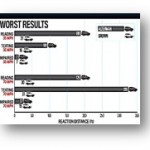
On November 8, 2014, University of Oregon linebacker Joe Walker returned a fumble one hundred (100) yards against the University of Utah for a touchdown.[1] Both football fans and the National Highway Traffic Safety Administration (NHTSA) agree—this is a long distance. A NHTSA report states that “sending or receiving a text takes a driver’s eyes from the road for an average of 4.6 seconds, the equivalent—when traveling at 55 mph—of driving the length of an entire football field while blindfolded.”[2] Despite the inherent dangers of intoxicated driving, NHTSA alleges that texting while driving makes teenage drivers twenty-three (23) times more likely to crash.[3]
Thirty-nine (39) states have banned texting while driving, which the Harvard Center for Risk Analysis Study attributes to over 3,000 deaths and 33,000 injuries per year.[4] Car and Driver Magazine tested individuals’ reaction times on a closed road course while sober, at the legal intoxication limit of .08, reading a text, and sending a text.[5] A red light in the vehicle indicated when the driver should brake while driving at speeds of 35 mph and 70 mph. Each trial tested the driver’s reaction to the signal five times, with the slowest reaction time (the amount of time between the activation of the light and the driver hitting the brakes) dropped from consideration and averaged the remaining four trials’ results.[6] The results under each condition (intoxicated, reading and writing a text) are displayed below with their sober, undistracted performance being the baseline. The attribution for the “Worst Results” chart below is noted in the following footnote.[7]
Ultimately, texting had the most substantial, negative effect on the test drivers. While drunken or drugged driving has been the focal point of major regulations, texting has quickly become a hazard to traffic safety. For instance, intoxicated driving fatalities have decreased approximately 25% between 2002 and 2011, whereas texting fatalities have increased significantly.[8] Some studies equate texting’s effect while driving to that of a driver after consuming four beers.[9]
Similar to how intoxicated driving may be prevented by using designated drivers, texting related incidents may be prevented by responding after a safe arrival or using hands-free communication devices such as Bluetooth. In the future, it can be expected that more states will provide more stringent texting regulations. For instance, in New Jersey, cell phone use while driving is “unlawful except when the telephone is a hands-free wireless telephone” and is enforced by fines up to $800 for repeat violators.[10] Of course, state laws vary on this subject, so be aware of the applicable penalties and relevant repercussions in your state.
About the Author: Steven Oberman has been licensed in Tennessee since 1980, and successfully defended over 2,000 DUI defendants. Among the many honors bestowed upon him, Steve served as Dean of the National College for DUI Defense, Inc. and currently serves as chair of the National Association of Criminal Defense Lawyers DUI Committee. Steve was the first lawyer in Tennessee to be certified as a DUI Defense Specialist by the National College for DUI Defense.
He is the author of DUI: The Crime & Consequences in Tennessee, updated annually since 1991 (Thomson-West), and co-author with Lawrence Taylor of the national treatise, Drunk Driving Defense, 7th edition (Wolters Kluwer/Aspen). Steve has served as an adjunct professor at the University of Tennessee Law School since 1993 and has received a number of prestigious awards for his faculty contributions. He is a popular international speaker, having spoken at legal seminars in 23 states, the District of Columbia and three foreign countries.
You may contact Steve through his website at www.tndui.com or by telephone at (865) 249-7200.
The author would also like to recognize and thank Matt Wayne, a second year law student at the University of Tennessee College of Law, for his research and editing contributions of this article.
[1] Utah celebrates TD too early, ESPN, http://espn.go.com/college-football/story/_/id/11845079/oregon-ducks-return-fumble-100-yards-utah-utes.
[2] Alcohol, Problems and Solutions, http://www2.potsdam.edu/alcohol/files/Driving-while-Texting-Six-Times-More-Dangerous-than-Driving-while-Drunk.html – .VG4DYYfleGN (emphasis added).
[3] Id.
[4] Todd Wilms, It Is Time For A ‘Parental Control, No Texting While Driving’ Phone, Forbes Business (Sept. 18, 2012).
[5] See Phil LeBeau, Texting And Driving Worse Than Drinking and Driving, CNBC (June 25, 2009), http://www.cnbc.com/id/31545004#; see also Michael Austin, Texting While Driving: How Dangerous is it?, Car and Driver Magazine, http://www.caranddriver.com/features/texting-while-driving-how-dangerous-is-it.
[6] Id.
[7] Id. (There were two test drivers that are represented by the brown and white vehicles labeled “Alterman” and “Brown” respectively.)
[8] State Alcohol-Impaired Driving Estimates, U.S. Department of Transportation, available at http://www-nrd.nhtsa.dot.gov/Pubs/811776.pdf.
[9] Strayer, Drews, Couch, A Comparison of the Cell Phone Driver and the Drunk Driver, University of Utah (2006), available at http://www.distraction.gov/download/research-pdf/Comparison-of-CellPhone-Driver-Drunk-Driver.pdf.
[10] Jacob Masters, Texting While Driving Vs. Drunk Driving: Which Is More Dangerous?, Brain Injury Society (Oct. 27, 2013), http://www.bisociety.org/texting-while-driving-vs-drunk-driving-which-is-more-dangerous/ (“First time offenders will face a fine of at least $200. . . . a second offense will increase to at least $400 and drivers who are caught a third time will face a fine of at least $600, a possible 90-day suspension of their driver’s license and will be assessed (3) three motor vehicle penalty points.”). N.J. Stat. Ann. § 39:4-97.3 (West); http://www.state.nj.us/mvc/About/safety_cellphone.htm.
